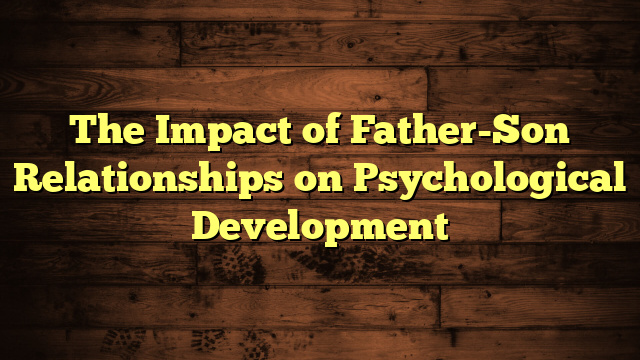The Impact of Father-Son Relationships on Psychological Development
The Impact of Father-Son Relationships on Psychological Development
Introduction
Father-son relationships play a crucial role in the psychological development of individuals. The bond between a father and his son can have a profound impact on various aspects of a person’s life, including their self-esteem, emotional well-being, and overall mental health. This article explores the significance of father-son relationships and how they shape psychological development.
The Importance of a Positive Father-Son Relationship
A positive father-son relationship provides a strong foundation for a child’s psychological development. When a father is actively involved in his son’s life, it fosters a sense of security and stability. This, in turn, contributes to the child’s overall well-being and helps them develop a healthy sense of self.
Research has shown that children who have positive relationships with their fathers tend to have higher self-esteem and are more resilient in the face of adversity. They are also less likely to engage in risky behaviors such as substance abuse or delinquency. A positive father-son relationship can serve as a protective factor against various mental health issues, including depression and anxiety.
Factors Influencing Father-Son Relationships
Several factors can influence the quality of a father-son relationship. One of the most significant factors is the level of involvement and presence of the father in the child’s life. Spending quality time together, engaging in activities, and having open communication are essential for building a strong bond.
Another factor that can impact father-son relationships is the quality of the father’s own relationship with his father. If a father had a positive relationship with his own father, he is more likely to have the skills and knowledge to foster a healthy relationship with his son. On the other hand, if a father had a strained or absent relationship with his own father, it may affect his ability to connect with his son.
Additionally, societal and cultural factors can also influence father-son relationships. Cultural norms and expectations regarding gender roles and parenting can shape the dynamics between fathers and sons. For example, in some cultures, there may be pressure on fathers to be authoritative and distant, which can hinder the development of a close and nurturing relationship.
Effects of Father-Son Relationships on Psychological Development
The impact of father-son relationships on psychological development is far-reaching. Here are some of the key effects:
- Self-esteem: A positive father-son relationship can boost a child’s self-esteem. When a father provides love, support, and validation, it helps the child develop a positive self-image and a sense of worthiness.
- Emotional well-being: Fathers play a crucial role in teaching their sons how to regulate and express emotions. A nurturing and emotionally available father can help a child develop healthy coping mechanisms and emotional intelligence.
- Gender identity: Fathers serve as role models for their sons, shaping their understanding of masculinity. A positive father-son relationship can help a child develop a healthy and balanced sense of gender identity.
- Communication skills: Fathers who actively engage in open and honest communication with their sons contribute to the development of effective communication skills. This can have a positive impact on the child’s relationships and overall social competence.
- Resilience: A strong father-son relationship can enhance a child’s resilience. When a father provides support and guidance during challenging times, it helps the child develop the skills to overcome obstacles and bounce back from adversity.
Conclusion
Father-son relationships have a profound impact on psychological development. A positive and nurturing relationship between a father and his son can contribute to various aspects of a child’s life, including their self-esteem, emotional well-being, and overall mental health. It is crucial for fathers to actively engage in their child’s life, spend quality time together, and provide love and support. By doing so, fathers can help shape their son’s psychological development and set them on a path towards a healthy and fulfilling life.

